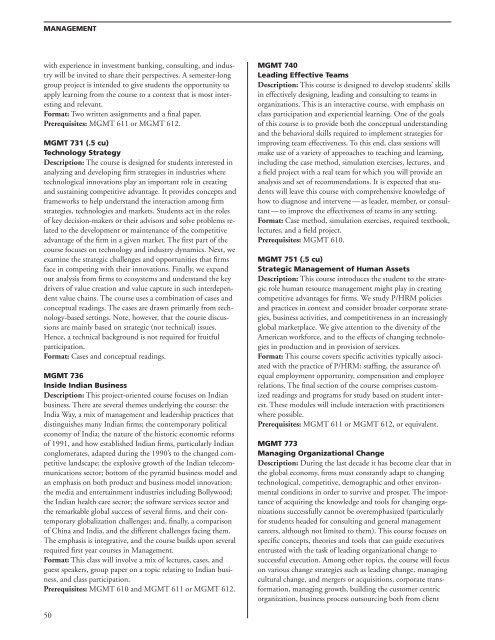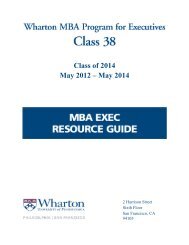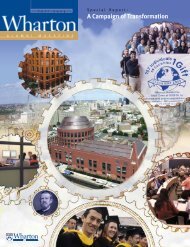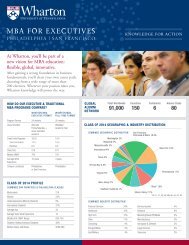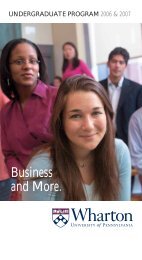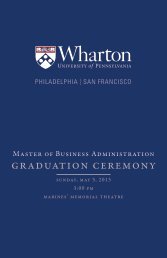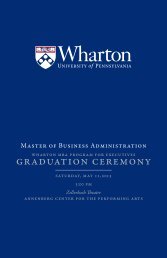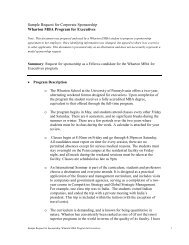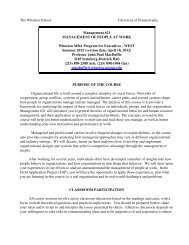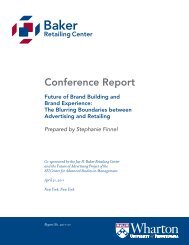Explore Options; Plan Your MBA Academic Program
Explore Options; Plan Your MBA Academic Program
Explore Options; Plan Your MBA Academic Program
Create successful ePaper yourself
Turn your PDF publications into a flip-book with our unique Google optimized e-Paper software.
MANAGEMENT<br />
with experience in investment banking, consulting, and industry<br />
will be invited to share their perspectives. A semester-long<br />
group project is intended to give students the opportunity to<br />
apply learning from the course to a context that is most interesting<br />
and relevant.<br />
Format: Two written assignments and a final paper.<br />
Prerequisites: MGMT 611 or MGMT 612.<br />
MGMT 731 (.5 cu)<br />
Technology Strategy<br />
Description: The course is designed for students interested in<br />
analyzing and developing firm strategies in industries where<br />
technological innovations play an important role in creating<br />
and sustaining competitive advantage. It provides concepts and<br />
frameworks to help understand the interaction among firm<br />
strategies, technologies and markets. Students act in the roles<br />
of key decision-makers or their advisors and solve problems related<br />
to the development or maintenance of the competitive<br />
advantage of the firm in a given market. The first part of the<br />
course focuses on technology and industry dynamics. Next, we<br />
examine the strategic challenges and opportunities that firms<br />
face in competing with their innovations. Finally, we expand<br />
our analysis from firms to ecosystems and understand the key<br />
drivers of value creation and value capture in such interdependent<br />
value chains. The course uses a combination of cases and<br />
conceptual readings. The cases are drawn primarily from technology-based<br />
settings. Note, however, that the course discussions<br />
are mainly based on strategic (not technical) issues.<br />
Hence, a technical background is not required for fruitful<br />
participation.<br />
Format: Cases and conceptual readings.<br />
MGMT 736<br />
Inside Indian Business<br />
Description: This project-oriented course focuses on Indian<br />
business. There are several themes underlying the course: the<br />
India Way, a mix of management and leadership practices that<br />
distinguishes many Indian firms; the contemporary political<br />
economy of India; the nature of the historic economic reforms<br />
of 1991, and how established Indian firms, particularly Indian<br />
conglomerates, adapted during the 1990’s to the changed competitive<br />
landscape; the explosive growth of the Indian telecommunications<br />
sector; bottom of the pyramid business model and<br />
an emphasis on both product and business model innovation;<br />
the media and entertainment industries including Bollywood;<br />
the Indian health care sector; the software services sector and<br />
the remarkable global success of several firms, and their contemporary<br />
globalization challenges; and, finally, a comparison<br />
of China and India, and the different challenges facing them.<br />
The emphasis is integrative, and the course builds upon several<br />
required first year courses in Management.<br />
Format: This class will involve a mix of lectures, cases, and<br />
guest speakers, group paper on a topic relating to Indian business,<br />
and class participation.<br />
Prerequisites: MGMT 610 and MGMT 611 or MGMT 612.<br />
50<br />
MGMT 740<br />
Leading Effective Teams<br />
Description: This course is designed to develop students’ skills<br />
in effectively designing, leading and consulting to teams in<br />
organizations. This is an interactive course, with emphasis on<br />
class participation and experiential learning. One of the goals<br />
of this course is to provide both the conceptual understanding<br />
and the behavioral skills required to implement strategies for<br />
improving team effectiveness. To this end, class sessions will<br />
make use of a variety of approaches to teaching and learning,<br />
including the case method, simulation exercises, lectures, and<br />
a field project with a real team for which you will provide an<br />
analysis and set of recommendations. It is expected that students<br />
will leave this course with comprehensive knowledge of<br />
how to diagnose and intervene — as leader, member, or consultant<br />
— to improve the effectiveness of teams in any setting.<br />
Format: Case method, simulation exercises, required textbook,<br />
lectures, and a field project.<br />
Prerequisites: MGMT 610.<br />
MGMT 751 (.5 cu)<br />
Strategic Management of Human Assets<br />
Description: This course introduces the student to the strategic<br />
role human resource management might play in creating<br />
competitive advantages for firms. We study P/HRM policies<br />
and practices in context and consider broader corporate strategies,<br />
business activities, and competitiveness in an increasingly<br />
global marketplace. We give attention to the diversity of the<br />
American workforce, and to the effects of changing technologies<br />
in production and in provision of services.<br />
Format: This course covers specific activities typically associated<br />
with the practice of P/HRM: staffing, the assurance of\<br />
equal employment opportunity, compensation and employee<br />
relations. The final section of the course comprises customized<br />
readings and programs for study based on student interest.<br />
These modules will include interaction with practitioners<br />
where possible.<br />
Prerequisites: MGMT 611 or MGMT 612, or equivalent.<br />
MGMT 773<br />
Managing Organizational Change<br />
Description: During the last decade it has become clear that in<br />
the global economy, firms must constantly adapt to changing<br />
technological, competitive, demographic and other environmental<br />
conditions in order to survive and prosper. The importance<br />
of acquiring the knowledge and tools for changing organizations<br />
successfully cannot be overemphasized (particularly<br />
for students headed for consulting and general management<br />
careers, although not limited to them). This course focuses on<br />
specific concepts, theories and tools that can guide executives<br />
entrusted with the task of leading organizational change to<br />
successful execution. Among other topics, the course will focus<br />
on various change strategies such as leading change, managing<br />
cultural change, and mergers or acquisitions, corporate transformation,<br />
managing growth, building the customer centric<br />
organization, business process outsourcing both from client


